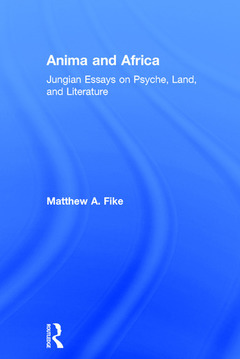Anima and Africa Jungian Essays on Psyche, Land, and Literature
Auteur : Fike Matthew A.

C. G. Jung understood the anima in a wide variety of ways but especially as a multifaceted archetype and as a field of energy. In Anima and Africa: Jungian Essays on Psyche, Land, and Literature, Matthew A. Fike uses these principles to analyze male characters in well-known British, American, and African fiction.
Jung wrote frequently about the Kore (maiden, matron, crone) and the "stages of eroticism" (Eve, Mary, Helen, Sophia). The feminine principle?s many aspects resonate throughout the study and are emphasized in the opening chapters on Ernest Hemingway, Henry Rider Haggard, and Olive Schreiner. The anima-as-field can be "tapped" just as the collective unconscious can be reached through nekyia or descent. These processes are discussed in the middle chapters on novels by Laurens van der Post, Doris Lessing, and J. M. Coetzee. The final chapters emphasize the anima?s role in political/colonial dysfunction in novels by Barbara Kingsolver, Chinua Achebe/Nadine Gordimer, and Aphra Behn.
Anima and Africa applies Jung?s African journeys to literary texts, explores his interest in Haggard, and provides fresh insights into van der Post?s late novels. The study discovers Lessing?s use of Jung?s autobiography, deepens the scholarship on Coetzee?s use of Faust, and explores the anima?s relationship to the personal and collective shadow. Itwill be essential reading for academics and scholars of Jungian and post-Jungian studies, literary studies, and postcolonial studies, and will also appeal to analytical psychologists and Jungian psychotherapists in practice and in training.
Introduction 1. Ernest Hemingway’s Francis Macomber in "God’s country" 2. The anima’s many faces in Henry Rider Haggard’s She 3. The anima and psychic fragmentation in Olive Scheiner’s The Story of an African Farm 4. "The reality of the singular": Anima and unus mundus in Laurens van der Post’s A Story Like the Wind and A Far-Off Place 5. "We are all sailors": C. G. Jung’s Memories, Dreams, Reflections and Doris Lessing’s Briefing for a Descent into Hell 6. "Not a bad man but not good either": The anima and individuation in J. M. Coetzee’s Disgrace 7. "The eyes in the trees are watching": The anima and feminine agency in Barbara Kingsolver’s The Poisonwood Bible 8. Mother is not supreme: The anima and (post)colonial strife in Chinua Achebe’s Things Fall Apart and Nadine Gordimer’s July’s People 9. The anima and shadow dynamics in Aphra Behn’s Oroonoko 263
Matthew A. Fike, Ph.D., is a Professor of English at Winthrop University in Rock Hill, South Carolina, where he teaches courses in critical thinking, Shakespeare, and Renaissance literature. He is the author of The One Mind: C. G. Jung and the Future of Literary Criticism (Routledge 2014).
Date de parution : 05-2017
15.6x23.4 cm
Disponible chez l'éditeur (délai d'approvisionnement : 14 jours).
Prix indicatif 178,41 €
Ajouter au panierDate de parution : 05-2017
15.6x23.4 cm
Disponible chez l'éditeur (délai d'approvisionnement : 14 jours).
Prix indicatif 61,25 €
Ajouter au panierThèmes d’Anima and Africa :
Mots-clés :
CW 9i; unus; Bugishu Psychological Expedition; mundus; Young Men; Matthew A; Fike; Unus Mundus; Hero’s Journey; Van Der Post; Vice Versa; Draw Back; Poisonwood Bible; Anima Possession; Shadow Work; July’s People; Aphra Behn’s Oroonoko; Main Characters; Maureen Smales; Chinua Achebe’s Things Fall; Gordimer’s July’s People; Laurens Van Der Post; Behn’s Portrayal; Puer Aeternus; Anima Projection; Psychic Fragmentation; Participation Mystique; Things Fall; Honey Comb



